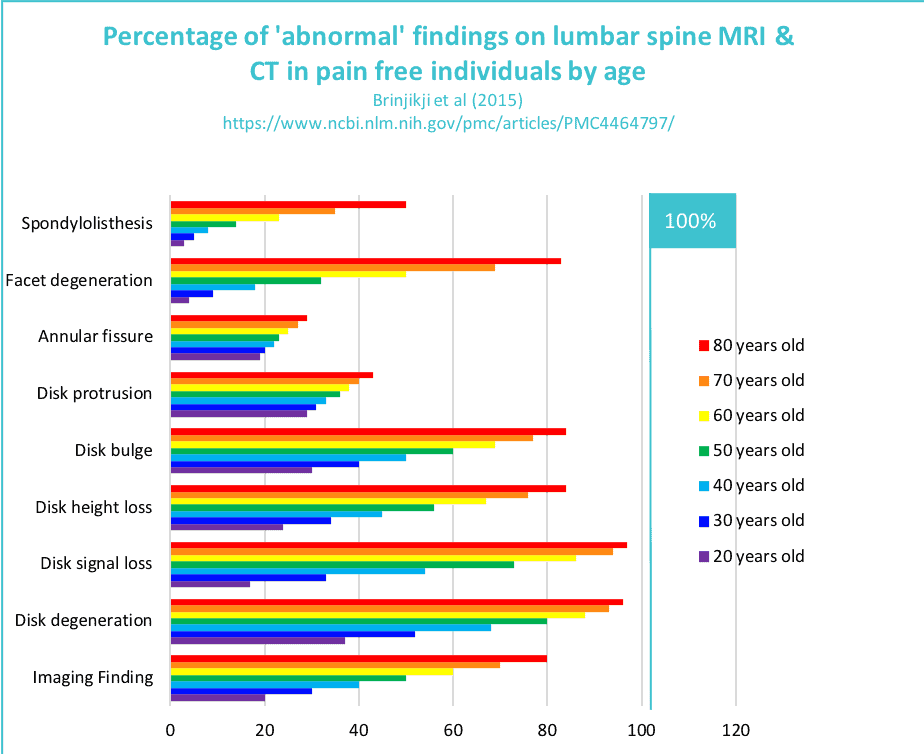Do I need a scan for my back pain?
- Does Swimming Build Muscle - October 22, 2023
- How To Sleep With A Frozen Shoulder - June 28, 2023
- Bankart Lesion - March 30, 2023
Back Scan: Value vs risk
X-rays and CT scans are the first choices as they cost significantly less than MRI scans and can effectively rule out serious pathologies such as tumours. Both of these forms of imaging have high levels of radiation.
Therefore, exposure should be limited to preserve health. MRI scans provide more detailed images with no radiation; however, these are very costly and are not always the best scan option for a particular issue.
What causes back pain?
Back pain is usually the result of a combination of factors coming together. These can include a mechanical force such as a fall or direct impact. But, what is important to understand is that other factors can pre-sensitise your nervous system. This can make it easier for an innocent action to set off pain as a response. These can be elements of your general well-being, such as your mental health and stress levels, sleep quality, physical activity and your beliefs about your back pain.
With about a third of all back pain, the individual cannot identify any physical event that triggered the pain. If we compare our reaction to back pain to when we have a headache, we would not fear that we have damage in our head unless we have had a physical event to cause it. Why is back pain considered so differently?
It is less than 1 in 10 (about 5-9%) of all back pain that is caused by an injury to a specific structure that might be a disc. And even more rare (less than 1%) is caused by a serious pathology such as a fracture, an infection or cancer.
Is bending dangerous?
To get back to the question of bending… No, research does not support that bending is bad for your back. Nor is it that holding your back straight is good for your back. Our back is designed to move in a range of directions and it gets stronger with use and loading. If you have pain, you may need to tone things down a little for the short term, but the gentle mobility and gradual return to activity will get you better. Bed rest for back pain is archaic advice and is not helpful.
How do I know if I need an MRI on my back?
What many people find difficult to understand is that structural changes to the spine and discs do not always correlate with back pain. Most changes that occur to our spine are a normal part of ageing. Often, if changes happen slowly, over a period of time, we are unaware of them, and we feel no pain from them.
The graph below shows the findings from a study looking at MRI scans of the lumbar spine (low back) of individuals aged between 20 and 80. All participants who were scanned were pain-free. The bars represent the percentage of people that had positive MRI results for the various physical changes listed.
You can see from this graph that we are more likely to develop various physical changes in our spine as we age. These are normal signs of ageing, like wrinkles on our skin. We could argue whether these are ‘abnormal’ findings. If 84% of 80-year-olds have a disc bulge, this seems more like a ‘normal’ finding for this age group.
So now that we know what is ‘normal’ to find on an MRI scan, we can be a bit more aware that the findings may not be the source of our pain but might be a red herring that could have been there long before pain developed.
It should be decided by a medical professional such as a Physiotherapist or a Sports Physician whether you need an MRI based on a clinical evaluation following a comprehensive assessment.

When is an MRI Scan for back pain helpful?
A scan is most useful to rule out serious pathologies such as fractures, tumours, and infections. It can also be used to see if there is impingement or contact on structures such as nerves. Usually, when pain is located only in the back with no referral pain elsewhere, a scan will not be useful and will not change your treatment plan.
A scan is needed when a collection of symptoms indicates that additional treatments may be needed or that exercise and physiotherapy alone may not be effective.
This would be if you have a collection of back pain along with referred pain such as into your buttocks, groin or down your legs; if there is bilateral leg pain; if there is a cluster of neurological symptoms such as numbness, pins, and needles and weakness in your legs; or if there are systemic symptoms such fever, night sweats, unexplained weight loss or constant pain.
A scan will often clear for serious pathologies, and non-invasive treatment will still be effective. It is only on rare occasions when invasive treatments such as injections or surgery are required.
Can a Physiotherapist order a Private MRI?
In the UK, a Physiotherapist can order an MRI. In private practice, a direct referral can be sent by a Physiotherapist for an MRI. Getting a scan within 5-7 days is normally possible, with results returning within 1-3 days.
How much does a Private MRI Scan cost?
An MRI scan normally costs between £200 and £300. Varying scales of cost can depend on the urgency of the scan and what specification of image quality is required
If you still have some unanswered questions or want to talk to a physio about any specific concerns that you may have, please get in touch with the Flawless Physio team here.
We offer Private Physiotherapy via online appointments for £60 and Face-to-Face appointments for £85 in our clinics.
